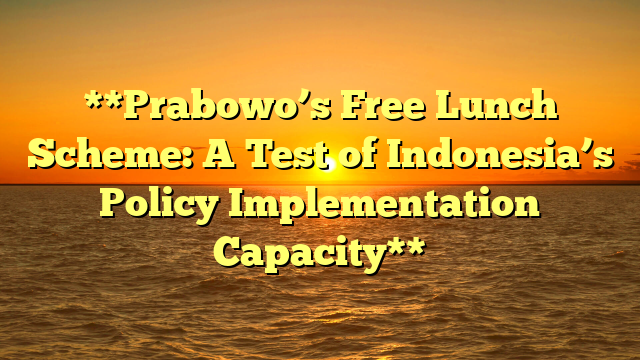
President-elect Prabowo Subianto’s proposed free lunch scheme is one of the most ambitious social welfare programs in Indonesia’s history. Aimed at providing nutritious meals to schoolchildren nationwide, the initiative has the potential to improve child health, enhance education, and boost the local agricultural economy. However, beyond its intended social and economic benefits, the program also represents a significant test of Indonesia’s policy implementation capacity. The success or failure of this initiative will not only define Prabowo’s leadership but also reflect the government’s ability to manage large-scale programs efficiently and sustainably.
At samosir88 of the free lunch scheme is the goal of tackling child malnutrition, a persistent issue in Indonesia. According to the World Bank, around 22% of Indonesian children under five suffer from stunting due to chronic malnutrition, which affects their cognitive and physical development. By providing free, nutritious meals in schools, the government hopes to improve students’ overall health, enhance their learning abilities, and ultimately create a more productive workforce. If executed properly, the program could play a crucial role in breaking the cycle of poverty and strengthening Indonesia’s human capital development.
Another key objective of the initiative is to improve educational outcomes. Hunger is a major barrier to learning, particularly for children from low-income families who often go to school on an empty stomach. Studies have shown that well-fed students perform better academically, have higher attendance rates, and exhibit greater concentration in class. By ensuring that children receive at least one nutritious meal per day, the free lunch scheme could lead to long-term improvements in Indonesia’s education system, helping to reduce disparities between socio-economic groups.
Despite these potential benefits, the program faces significant challenges, particularly in terms of financial sustainability. Providing free meals to millions of schoolchildren daily will require an enormous budget, estimated to be in the tens of trillions of rupiah annually. Critics argue that without a clear and sustainable funding strategy, the initiative could place a heavy burden on Indonesia’s fiscal resources, potentially leading to budget deficits or cuts to other essential services. The government must explore diverse funding sources, including public-private partnerships, subsidies, and efficiency-driven budget reallocations, to ensure the program’s long-term viability.
Logistical and administrative challenges also pose a major test for Indonesia’s policy implementation capacity. The country’s vast and diverse geography, with thousands of islands and remote communities, makes food distribution a complex undertaking. Ensuring that meals reach schools in rural and hard-to-reach areas while maintaining quality and safety standards will require efficient supply chain management, infrastructure improvements, and strong inter-agency coordination. Additionally, preventing corruption, food wastage, and mismanagement will be crucial to the program’s success. The government must establish strict monitoring mechanisms and transparent reporting systems to ensure accountability at all levels.
In conclusion, Prabowo’s free lunch scheme is not just a welfare initiative; it is a critical test of Indonesia’s ability to design, fund, and execute large-scale social programs effectively. While the policy holds the promise of significant social and economic benefits, its success will depend on the government’s ability to manage its financial, logistical, and administrative challenges. If implemented efficiently, the program could serve as a model for future public welfare initiatives. However, failure to address these challenges could undermine public trust and highlight persistent weaknesses in Indonesia’s policy implementation capacity.




